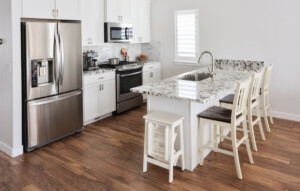
Organizing a small kitchen can be challenging. Limited counter space, cramped cabinets, and cluttered drawers make it difficult to find what you need and hard to cook and entertain.
Fortunately, there are many small kitchen organization ideas that can help you make the most of your space while keeping it stylish and clutter-free. With the right know-how and a few simple tricks, you can turn your kitchen into the heart of your home.
So, whether you live in a Wilmington, NC, apartment or a Brentwood, CA, home, read on for 26 ideas to take your small kitchen to the next level.
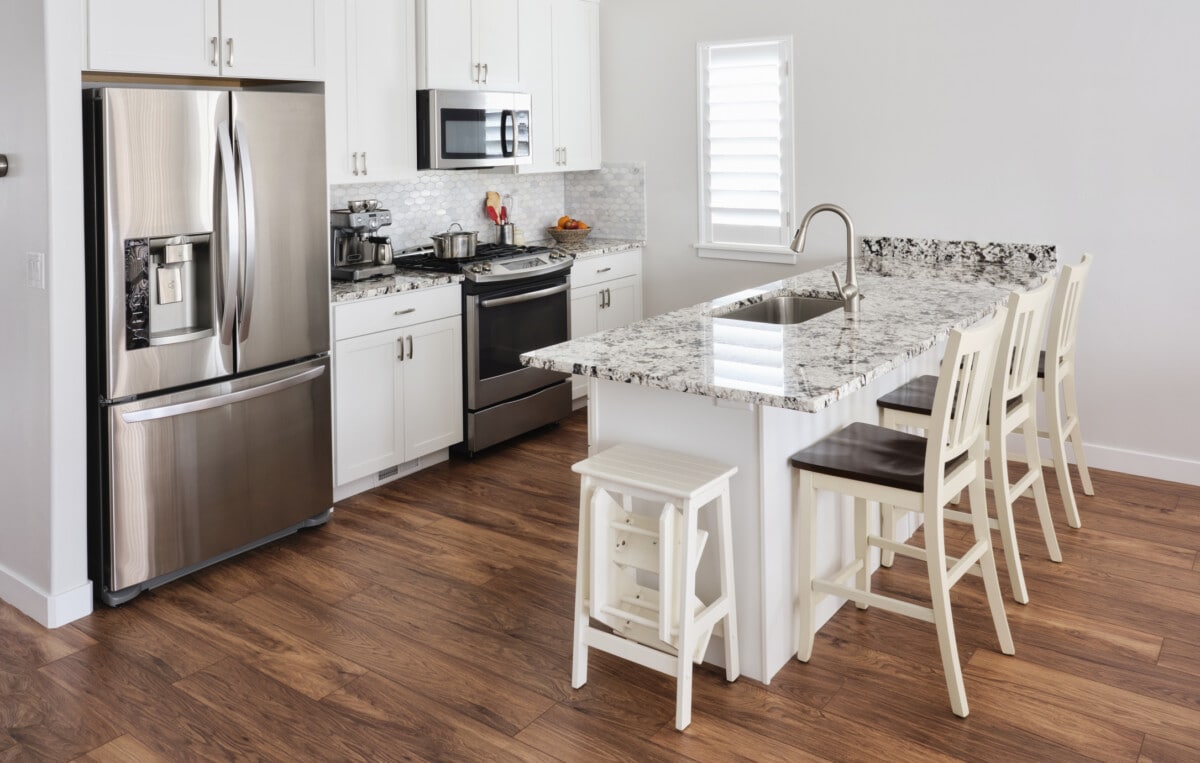
1. Visualize your space before decluttering
Before embarking on an organizing project, step back and visualize how you want to use your kitchen. “Lay out a design on paper before unpacking your boxes and putting everything into drawers,” suggests Karin E. Fried, owner of Organizational Consulting Services. “Planning out your layout in advance will help your kitchen function better and your life run smoother.”
2. Get creative with your space
As you begin your project, be creative. Kitchens don’t need to look or feel the same. “First, write down your ‘needs’ for your kitchen,” advises Joshelle Wright, founder of Get Your Space Wright. “Then, get creative in addressing your needs by maximizing your space.”
3. Establish ground rules for yourself
Once you visualize how you want your space to look, it’s time to establish organizational ground rules. Pamela Bass-Patterson, owner of Organization To The Rescue, suggests these five rules to organize your kitchen:
- Make sure there are no dirty dishes in the sink
- Regularly put away any dishes in the dishwasher or dish drain
- Store small appliances in drawers and cabinets
- Keep the island free of clutter
- Put food products back where they belong when you’re done eating them.
4. Map out zones for different activities
At the beginning of the decluttering process, Julia Baum, owner of Organize YourShelf, recommends deciding where you want to do certain activities in your kitchen. “Map out zones in your kitchen for different activities, such as baking, food prep, and more,” she says. “This will help you keep items near where you use them.”
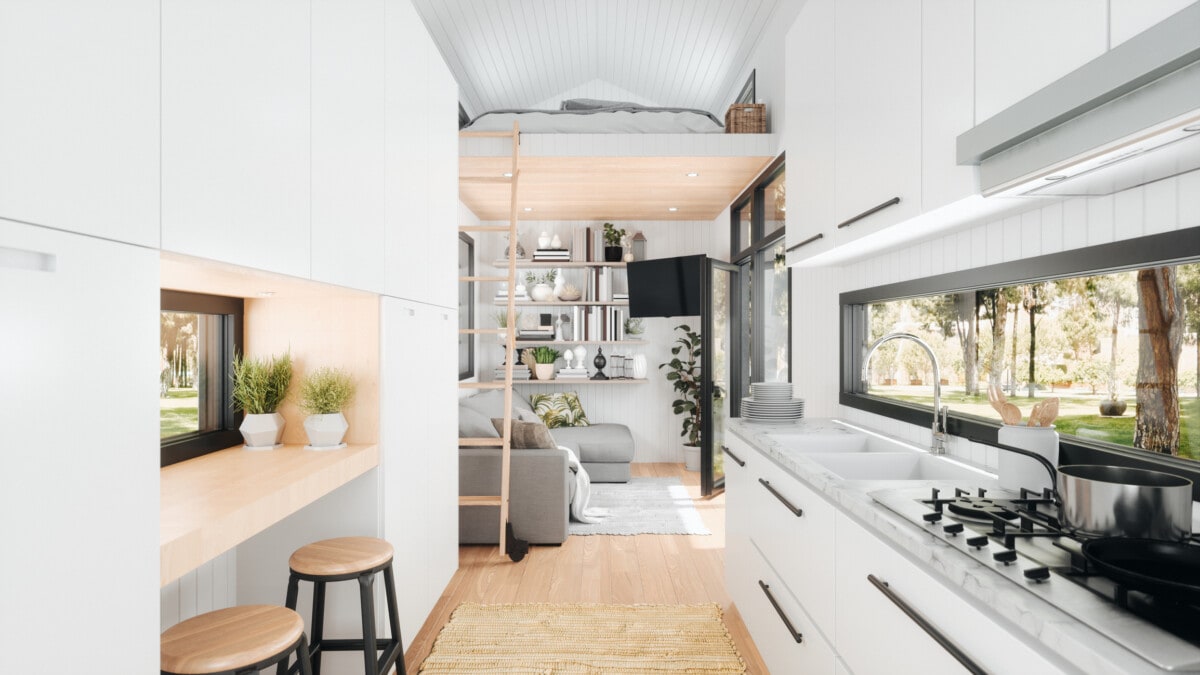
5. Give your kitchen a seasonal reset
As seasons change, one of the best things you can do for your home is to take the time to declutter and refresh your kitchen. Here are a few tips from Charlotte Berlin, owner of Simplified by Charlotte, about giving your kitchen a reset:
- Check the expiration dates on food in the fridge and pantry
- Clear your junk drawer of any old bills, receipts, and takeout menus
- Reevaluate the condition and placement of your kitchen tools
- Reduce clutter by purging unused kitchenware
6. Use storage you already have
Instead of remodeling your kitchen or purchasing storage solutions, working with what you already have can be easier and more budget-friendly. “For example, if your cabinets don’t go all the way to the ceiling, consider using the surface above your cabinets to display and store infrequently used items decoratively,” recommend Matina Kazameas & Kristina Harris, co-owners of Two Tidy Tinas. “This space is perfect for things like pitchers, serving bowls, and large kitchen appliances.”
7. Utilize vertical space
One of the easiest ways to maximize storage in a small kitchen is to use your vertical space. “Walls are a great vertical storage solution for small kitchens,” says Dannickova Gomez, founder of The Practical Edit. “You can add floating shelves and let your imagination run wild,” she says.
In addition to floating shelves, Julie Starke, owner of Keys to Living Light, also recommends installing racks and hooks. “This can help free up cabinet space and add some interest to your walls,” she says.
Another option is to use a pegboard or magnetic strip to hang utensils and knives for quick access. “A pegboard can be customized to fit even odd-shaped walls or corners to hold cooking utensils and pans,” notes Leslie Lainer, owner of Organize with Leslie. “And don’t forget to use the back of a door to hold small pantry items or essential kitchen utility items,” she advises.
Lastly, hanging pan organizers can help you utilize vertical space instead of stacking items on top of each other. “They’re also great for cookie sheets, cutting boards, and even large casserole dishes,” say Jamie & Kristin, co-owners of Get Organized RVA.
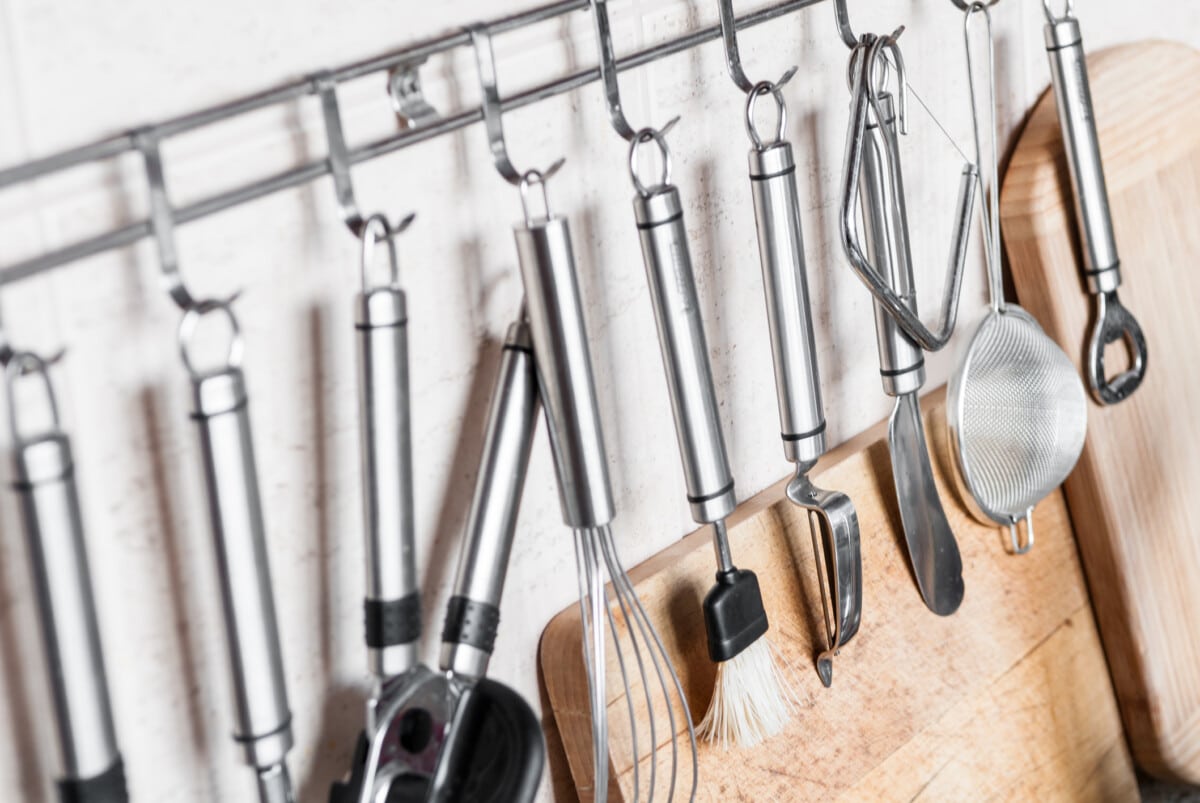
8. Use over-the-door organizers
Another vertical storage solution is to use your doors. “Over-the-door organizers are perfect for storing smaller items like spices, condiments, snacks, and supplements,” advises Sarah Dunn, owner of Ready Set Organize. “This frees up shelf space for larger items and makes it easy to find what you need.”
9. Maximize storage space
If you have a small kitchen, you’re likely dealing with storage space issues. “If this is the case for you, try installing large expanding shelves, three-tier expandable shelves, and multipurpose bins,” says Meighan Meeker, owner of Simply Put Organizational Solutions for the home.
Along with using vertical space and grouping similar times together, another option is to use both open- and closed-top bins for storage. “Most of all, remember to have fun with your kitchen,” says Dennise Conforti, owner of Organized MD.
10. Use stackable containers
To make the most of limited pantry space, “try using clear, stackable storage containers and baskets to store items vertically,” suggests Mae Edwards, owner of Minimize with Mae. “You can also install small shelves or spice racks on the inside of pantry doors to make use of unused space.”
Uli Philps, owner of Neat4Ever, agrees that stacking is necessary for the smallest kitchens. “You don’t even have to purchase anything new,” she says. “Make the most of stackable items you already own, like mugs, glasses, and bowls. You can also invest in collapsible colanders for easy storing.”
Lastly, if you have the choice between round and square containers, choose square ones. “Square containers are always better than their round counterparts because they more efficiently use pantry and drawer space,” clarifies Catherine Croucher, owner of Curated Dwelling. “However, above all else, choose items that work for you.”
11. Prioritize your pantry
As you organize your kitchen, make sure to focus on your pantry. “Toss any expired food and spices and see how much more room you have than when you started,” advises Ashley Stefanko, owner of Home Reimagined.
In your pantry and cabinets, maximize space using the 70/30 rule. “Always have 30% of the cabinet space available for use and fill 70% with organized belongings,” says Karen Buschini, owner of In Its Place Organizing.
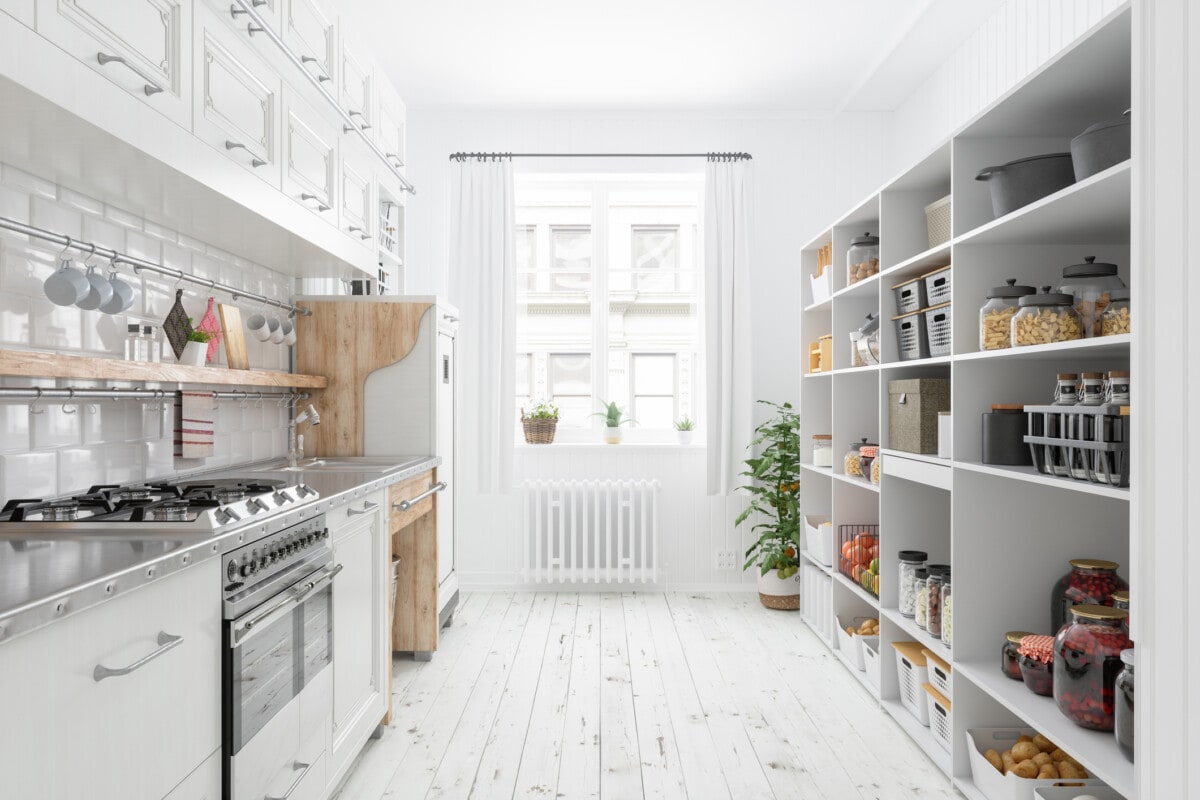
12. Keep your countertops clear
Throughout the organization process, keep the counters clutter-free, no matter what. “If you’re having trouble storing items off of the counter, consider using wall space or other vertical solutions,” recommends Laurie Palau, founder & CEO of Simply B Organized. “Install hanging buckets for silverware or utensils, magnetic strips for knives, and wall-mounted pot racks for pots and pans,” she says.
Sidney Young, owner of Need Organizing, agrees that keeping your countertop clear is essential. “Make sure to designate an easy place for every item in your kitchen so that anyone can clean up without instructions,” she says.
13. Incorporate portable storage solutions
If you’re seriously low on cabinet or counter space, use a portable storage solution, such as a rolling cart or baker’s rack. “These are great for pantry items and small appliances,” says D’Nai Walker, owner of d’Clutter by D’Nai. “Another option is to use shelf risers to make the most out of cabinet space you do have.”
14. Give every item a home
Make sure everything has a permanent home. You can do this by reducing clutter and incorporating unique storage solutions. “Think about adding pull-out drawers for easy access to low cabinets, drawer organizers for storing cutlery and utensils, and clear storage bins for grouping food together,” suggests Jeanne Taylor, owner of Tailorly.
Another option is to use drawer dividers, no-skid drawer liners, and peg systems to help keep items in their designated homes. “Cabinet organizers that hang over the inside of the door or a few well-placed hooks can be a great place for cutting boards or a stray colander,” notes Neel, owner of Queen B Organizing.
Lastly, keep similar items together. “Store ladles, spoons, and stirrers together in the same container,” recommends Nancy Deutsch, owner of The Empathic Organizer.
15. Only keep what you use
The key to small kitchen organization is only keeping items you use frequently. “Start by eliminating duplicates and prioritizing multipurpose items,” says Maggie Brittain, Master KonMari® Consultant and owner of Chesterfield Organizing Co. “Remain mindful of what you allow into the space and set non-negotiable space resetting routines.”
Shira Frager, owner of Set Things Straight, suggests storing items you only use every few months. “The only things that should be kept in the kitchen are things you use every day,” she says.
16. Place frequently-used items in accessible areas
Organizing is all about prioritization and using your space wisely. “Keep the kitchen tools and items you use most frequently in accessible areas, and place other items elsewhere,” recommends Marcus Larrea, Team Lead of Palm Paradise Real Estate. “This helps with the overall function of your kitchen.”
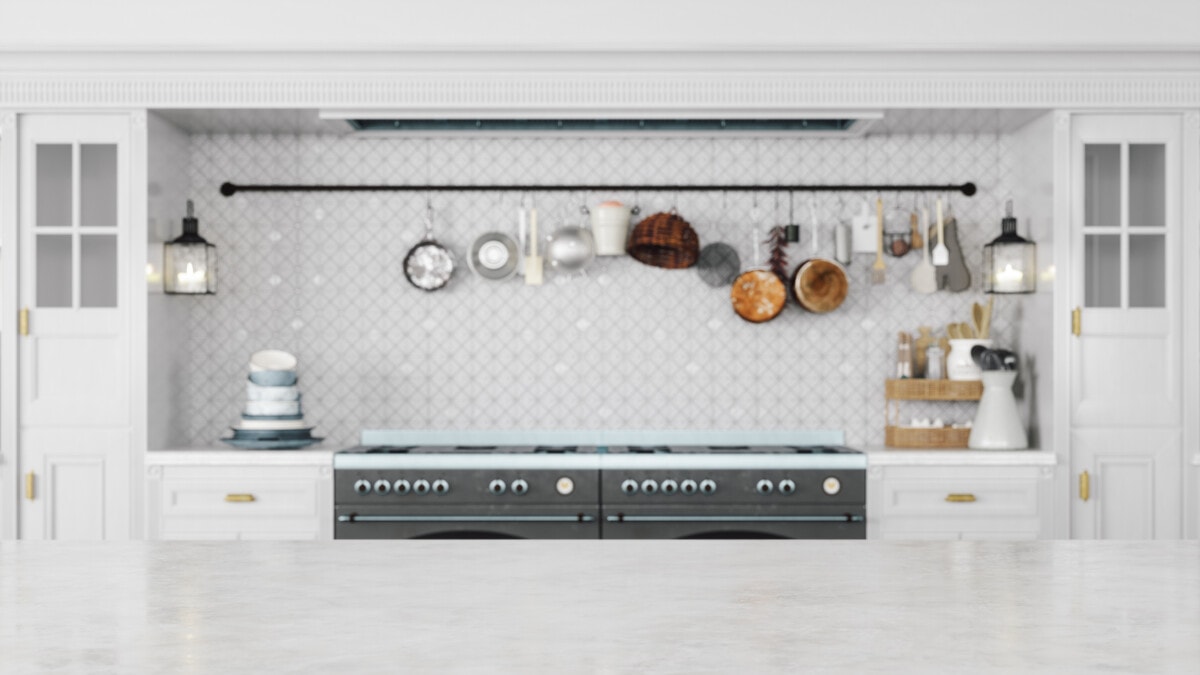
17. Store infrequently-used items elsewhere
Items that you don’t use as frequently can take up valuable space and interfere with your kitchen’s function. “When you’re decluttering kitchen items, ask yourself if you only use that thing once or twice a year,” says Dana Gilgrist, owner of How Neat! by Dana. “If you don’t use it often, consider storing it elsewhere, like your basement or closet.”
Amanda Olson-Schmidt, owner of Happy Sort, agrees. “If you only entertain once or twice per year, store serving dishes in an easy-to-carry bin and move it to another area of your home,” she says. “Also, don’t be afraid to let go of items you never use, like cake pans and extra pots.”
18. Abandon single-use gadgets
Get rid of single-use gadgets, like avocado slicers and avocado corers. “These take up too much space in a small kitchen and are easily replaced by a sharp knife,” says Kimberly Wolfe, owner of Abundant Life Organizing.
Missi McKown, owner of Clear Spaces Organizing, suggests asking yourself: “If I don’t have this tool, is there something else I could use instead?” “It’s often easier and more efficient to grab a knife instead of a gadget,” she says.
19. Prioritize multipurpose gadgets
Too many single-use items can take up a lot of valuable countertop, drawer, and cabinet space. To avoid a cramped kitchen, Jennifer Du Bois, owner of Organized by Jen D, advises choosing multipurpose appliances. “Multipurpose appliances are a better choice for simplifying your cooking process and keeping your kitchen organized,” she says.
Small kitchens can be easier to organize than large kitchens as long as everything has a purpose. “Choose multipurpose appliances to save space,” says Carol Coffey, owner of Coffey Home Organization. “However, watch out for duplicates,” she says. “If you only ever go to the same strainer or pan every time, get rid of the rest.”
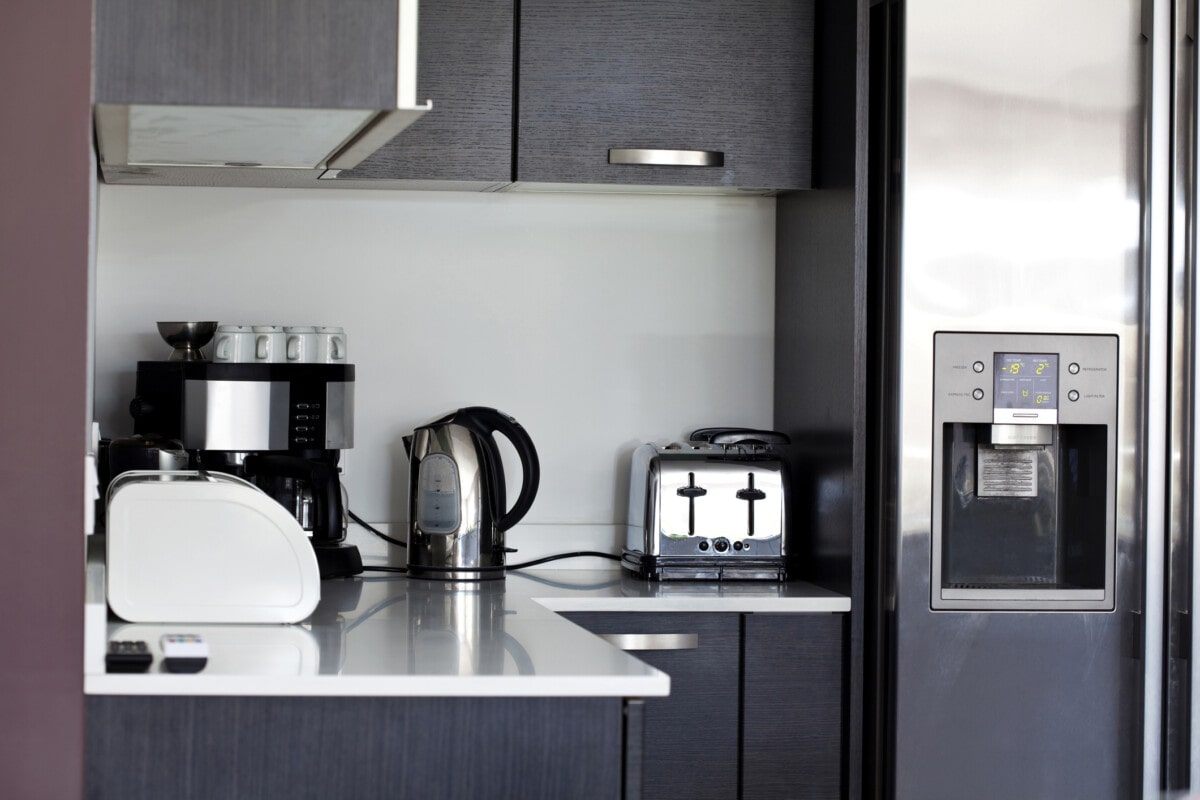
20. Use pull-out drawers
Convert inaccessible and unusable deep cabinets into convenient storage by installing pull-out shelves or drawers. “Pull-outs help you access items safely and easily,” notes Sherri Curley, owner of The Practical Sort. “And, seeing what you have at a glance can help you reduce duplicate purchases.”
Andrea Dechtman, owner of organized by andrea, suggests using drawer dividers and organizers. “These can keep utensils, food storage, baking sheets, dish towels, and other small items neatly arranged to create a more functional space,” she says.
21. Try creative storage solutions
Some kitchens require creativity to function. For example, instead of using valuable drawer space for cooking utensils that you use a lot, “store them neatly in a decorative crock next to the stove where they’ll be in easy reach,” note Suzy and Etelka, co-owners of Simply Organized Solutions For You. “Only put as many utensils as will fit in the crock.”
If you’re renting or not planning on remodeling, “consider adding removable, stackable shelves,” recommends Naomi Cook, owner of Open Doors Organizing. “Place these in gaps between existing shelves for extra storage.”
Shelf gliders are also an excellent option for narrow and deep pantries. “They make the space in the back accessible,” says Jolene Monaco, owner of Habitually Organized. “Turntables are another great option for deep corners and shelves.”
Juliana Meidl, owner of Serenity at Home, agrees and also suggests using turntables. “They’re great for spices and oils in a cabinet and work well for cleaning products under the sink,” she says.
22. Consider under-sink storage
Under-sink storage can be a lifesaver in a small kitchen. “Consider using a pull-out bin or basket to store cleaning supplies or a tension rod to hang spray bottles,” notes Kim Snodgrass, owner of Rustic Home Organizing. “You can also use an over-the-door organizer to store extra sponges or towels.”
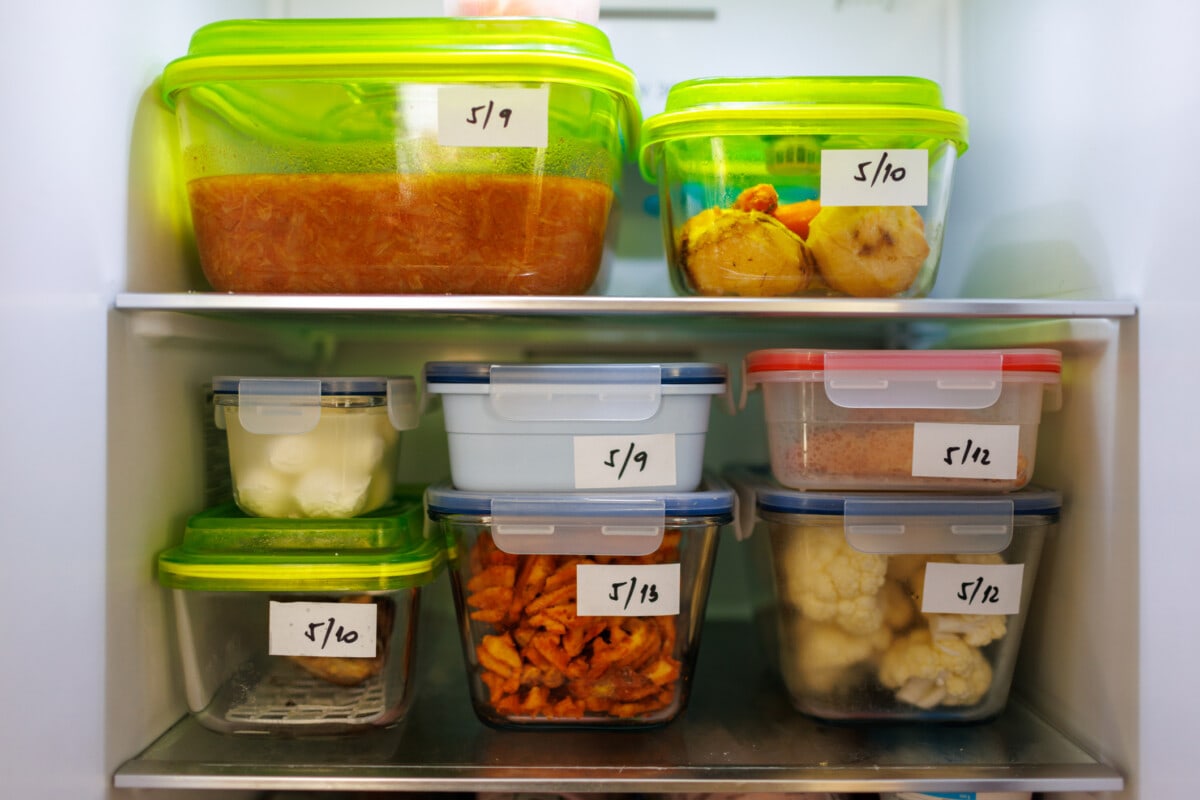
23. Go through your fridge regularly
Food goes bad faster than you think and can easily get lost in a fridge. “To help, consider making a three-month calendar reminder that falls on a day off to remind you to go through and pull out food nearing their expiration dates,” advises Nichole Gehman, owner of Organize by Designe. “Then, incorporate this food into your weekly meal planning to minimize food waste and save money.”
As you organize your fridge, ensure you can see everything inside. “You don’t eat what you can’t see,” notes Rebecca Steinberg, owner of Luxury Organized. “To avoid rotting food, put your favorite foods in labeled clear containers,” she suggests.
24. Maintain a balance between storage and belongings
As you’re organizing your kitchen, it’s essential to keep a balance between the number of things you have and the amount of storage available.” This means removing anything you don’t regularly use and increasing the storage, such as using the insides of doors and cabinets,” says Brandi Khoury, owner of Minimal is Bliss.
25. Treat your kitchen like functional art
You should be proud of your kitchen and feel like it’s a work of art. To help, “create an attractive kitchen by paying attention to form, function, and color,” says Karen Knight, owner of Essential Concierge. “For the countertop, start with a pretty fruit bowl,” she says. “Whether it’s blown glass, a carved wood bowl, or a ceramic, make sure it’s something you love.”
Use this piece as a countertop feature, and keep it filled with brightly-colored fresh produce to light up your room and encourage you to eat healthily.
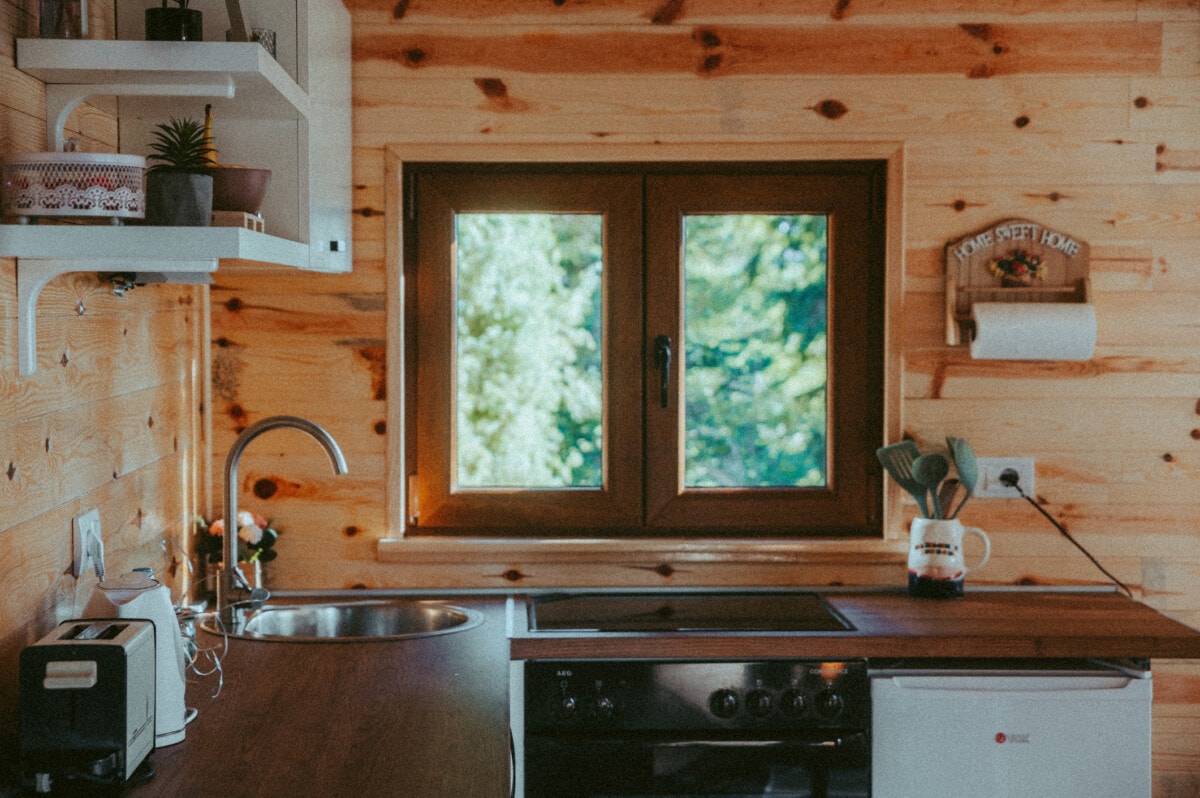
26. Declutter regularly
Lastly, make sure to establish a regular decluttering routine. Regular cleaning and decluttering will make it easier to find what you need and maintain a clean and functional space.
Start with anything perishable, like pantry items and anything in your fridge. “Toss out food that’s past its prime and give the surfaces a good clean,” suggests Rebecca Jo-Rushdy, KonMari Platinum Consultant and owner of Spark Joy & Flow. “Next, move on to dining supplies and donate anything you don’t regularly use,” she says. “Finish off with the cooking tools and appliances and get rid of anything that’s collecting dust.”
One of the best ways to maintain spaces and rooms is to use the one-in, one-out rule. “If you bring something new into your home, get rid of something of equal or greater size,” advises Martha Tobin, owner of Declutter4Good. “By applying this rule, you allow more space in your life.”
The post 26 Small Kitchen Organization Ideas to Simplify Your Home appeared first on Redfin | Real Estate Tips for Home Buying, Selling & More.
from Redfin | Real Estate Tips for Home Buying, Selling & More https://ift.tt/Q9Xf6dF


No comments:
Post a Comment